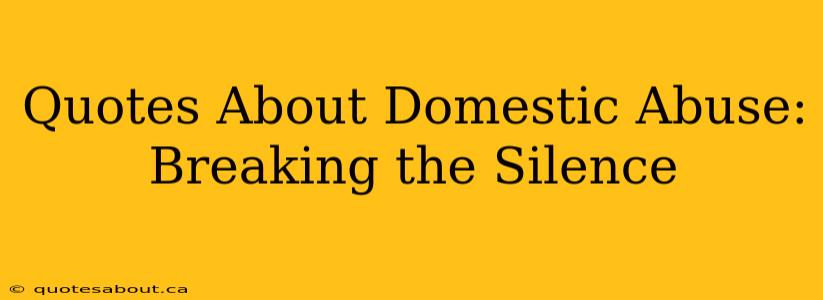Domestic abuse, a pervasive issue shrouded in secrecy and shame, leaves countless individuals trapped in cycles of violence and fear. Understanding the dynamics of abuse requires acknowledging its multifaceted nature and the profound impact it has on victims. While statistics paint a grim picture, the raw emotion and lived experience are often best captured through powerful quotes. These quotes, from survivors, advocates, and experts, offer a glimpse into the complexities of domestic violence and illuminate the urgent need to break the silence.
What are the signs of domestic abuse?
Recognizing the signs of domestic abuse is crucial for both victims and those seeking to help. Domestic abuse isn't solely physical; it encompasses a spectrum of controlling behaviors. These can include emotional manipulation, intimidation, financial control, isolation from friends and family, and threats of violence. Physical violence is, of course, a significant indicator, but the insidious nature of emotional abuse can be just as damaging, often escalating over time. The subtle erosion of self-worth and the constant fear of unpredictable outbursts are hallmarks of this insidious form of control. If you or someone you know is experiencing these behaviors, it's crucial to seek support.
What causes someone to stay in an abusive relationship?
Many people wonder why victims don't simply leave abusive relationships. The reality is far more complex than this simplistic question suggests. Fear, economic dependence, social isolation, and the hope for change are just a few of the powerful factors that can keep someone trapped. The abuser often employs manipulative tactics to maintain control, creating a sense of dependence and fostering a belief that leaving would be impossible or even more dangerous. Moreover, the emotional toll of abuse can severely impair a victim's ability to make rational decisions, making escape seem insurmountable. Understanding these complexities is crucial to fostering empathy and providing effective support.
How can I help someone who is experiencing domestic abuse?
Helping someone experiencing domestic abuse requires sensitivity, patience, and a commitment to safety. It's crucial to listen without judgment, validate their feelings, and offer unconditional support. Encourage them to seek professional help from a domestic violence shelter or a qualified therapist. Offer practical assistance, such as help with finding safe housing or legal aid, but avoid pressuring them into leaving the relationship before they are ready. Remember, their safety is paramount. Your role is to be a source of strength and a beacon of hope, guiding them towards a path of healing and empowerment.
What resources are available for victims of domestic abuse?
Numerous resources are available for victims of domestic abuse, providing vital support and a lifeline to safety. These include national and local hotlines, shelters offering safe housing and counseling, legal aid services to assist with protective orders and custody battles, and therapy to address the emotional trauma of abuse. Many online resources also provide information, support groups, and connections to local services. It’s crucial for victims to know that they are not alone and that help is available. Finding the right support system can be a critical step in breaking free from the cycle of abuse.
Is domestic violence a gendered issue?
While domestic violence disproportionately affects women, it's crucial to acknowledge that men and individuals across the gender spectrum can also be victims. Societal norms and expectations often contribute to underreporting and a lack of resources tailored to men's experiences. The dynamics of abuse remain similar regardless of gender, focusing on power and control. Breaking down harmful gender stereotypes and promoting inclusive support systems are essential to ensure that everyone experiencing domestic violence can access the help they need, regardless of their gender identity.
Conclusion: A Collective Effort to End Domestic Abuse
The quotes about domestic abuse presented throughout this article, while deeply affecting, serve as a poignant reminder of the pervasive nature of this issue. Breaking the silence requires a collective effort, encompassing education, prevention, and comprehensive support systems for victims. By understanding the complexities of abuse, challenging harmful societal norms, and offering unwavering support, we can create safer communities and empower those who have been silenced for far too long. Remember, help is available, and you are not alone.

